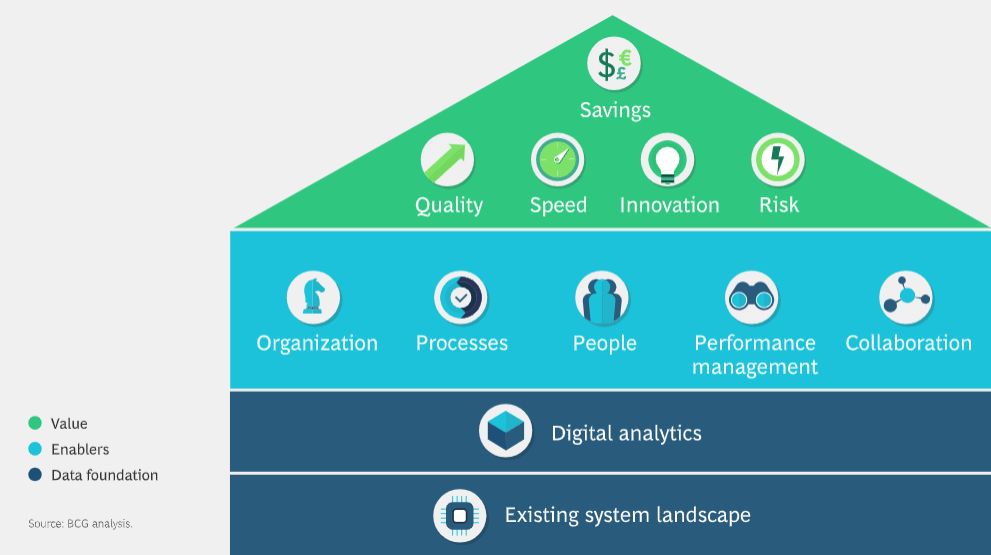‘The pace of change has never been faster, but it’s never going to be this slow again’ – This is a great line, maybe construable as a platitude, but it has proven true in digitalization in the last two decades.
Nonetheless, in procurement this mystical digitalization has rarely been paradigm changing, or truly disruptive, but rather incremental. Suddenly, five-step tasks are compressed to two steps, rather than fully automated. End-to-end procurement suites have only recently become truly cross-process integrated, and that’s mainly the market leaders. Spend and validation AI is still in relative infancy.
As ‘change’ is happening at an ever-accelerating pace, and change builds on previous advancements, early-movers have built up significant momentum and opened a running gap on the digitalization- and data-track. The modern innovation game is not serendipitous, but deliberate and block-by-block.
The early-movers scope for and understand upcoming innovations and developments. They are aware of their own deficits and data and are eager to identify appropriate opportunities. Their processes and ecosystems allow for unbureaucratic testing and integration. Their risk and legal departments understand sandbox environments and minimum-viable-product targets, as well as the cost and value of time.
Most importantly, their teams are willing and able to learn and teach each other how to use new tools and methods and are intrinsically motivated to exploit them to maximum efficiency.
How is this relevant to procurement?
Organizations with a concrete and instilled sense of purpose perform better and are happier. Even Mark Carney recently said as much with a very particular focus. Procurement’s mission and tactics should follow suit and have standing in their own right.
As we transition into an economic downturn, I propose that procurement focus on analytics and data transparency rather than radical step change to catch up. Procurement should be uniquely placed to tie up spend data and understand operational requirements.
While many procurement organizations have an understanding of spend and needs, they may still be under-equipped to position their insights meaningfully and impactfully.
This is typically due to one of the following:
- Improper data inputs by business users and subsequently lack of ‘clean’ data and of continuous, targeted housekeeping
- Mistaking volume of data and ‘we have that somewhere’ with useful, accessible data
- Knowledge is in people’s minds while…
- … they lack advanced data interrogation and validation skills, particularly with larger data sets to ‘sell the value’ they know exists
- Outdated and complex analysis and visualization tools
- Lack of access to and actual use of market intelligence such as indices and reports
Use the moment!
The downturn presents an opportunity. Category managers and buyers alike will be in the spotlight to identify cost-savings and to make spending more transparent. Organizations that focus on analytical capability development will be able to showcase methods and value-add via actionable insights. This should not only act as catalyst to strengthen relationships and repute internally, and for short-term results for a future step change in performance – it will also be the cornerstone for non-cost related assessments (notably; risk and sustainability).
According to Zion Market Research. The global business analytics market was valued at £54B in 2018 and is growing at 6.4% CAGR annually. Out of that, the procurement analytics market makes up £1.2B, but is increasing its share at >20% growth annually.
In 2012, Harvard dubbed data scientist the Sexiest Job of the 21st Century. In the US, data scientists earn on average twice as much as comparable experience business jobs, even more in procurement and supply chain. On LinkedIn in London there are currently ca. 1,300 postings for category managers and just above 900 for procurement data scientists and analytics experts. Expert, or proficient, users of leading applications, such as CSO, formerly TradeExtensions, are in high demand and short supply.
Don’t be left behind in this trend! Build capabilities!
What should you do – to start?
Take honest stock of your analytics capability. A simple list of missions could look as follows:
1. Create a procurement data strategy and plan
While cost-savings will be the immediate prize from upping your analytics game, having an aligned understanding of your data needs, gaps, and targets will be your real, sustainable trophy.
2. Build intelligent, actionable insights from target data sets
Follow through on your plan. Go beyond your procurement reports and dashboards. Data is there to be used, not just to be shown. Set up regression analyses. Task an analyst with building automated, dynamic, updatable models. You should not be limited by your existing platforms.
3. Create a business case for advanced analytics tool sets and capabilities
Excel is the world economy’s strained backbone and while it’s also evolving rapidly its discs are popping out. Combinatorial, statistical, and predictive multi-variate analyses, however, are not beyond reach. Partner with providers to demo advanced tools’ simplicity and ROI.
4. Procurement professionals – Enhance your analytics skill set, now
This is a simultaneous top-down and bottom-up proposition. Excite your people about data. Show them how simple advanced tools are. But further, say you are a category director and need a pioneering margin analysis for a new range, don’t just rely on your support teams. Get your hands dirty!
All of this may be via auto-didactic and internal training, or external team augmentation and consultants. Either way, the case for data proficiency and planning cannot be understated.
Getting enablers and digital analytics capabilities in place does not need to be deeply disruptive if it’s a cultural, purposeful strategy. Procurement can evolve through data and analytics and prove its ability to identify and leverage advanced tools when necessary and drive their adoption in the future.



